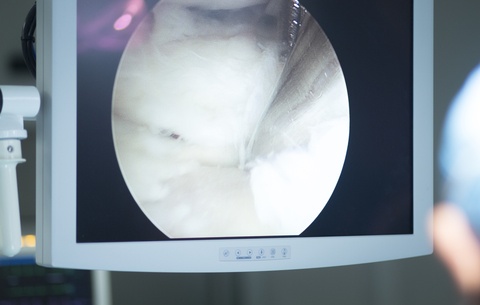
Shoulder pain can start off as a mild annoyance—perhaps a twinge when lifting something overhead or discomfort when reaching behind your back. But when that pain lingers, worsens, or begins to interfere with your daily activities, it may be a sign of something more serious.
At Dr. Rami Hamed Center (DRHC) in Dubai, we often see patients who’ve been living with unexplained shoulder discomfort for weeks or even months. If rest, medication, or physiotherapy hasn’t worked, your doctor may recommend an MRI to uncover the root cause of the problem.
Let’s explore when an MRI might be necessary, what the scan can reveal, and what to expect from the process.
Why Shoulder Pain Sometimes Needs More Than Rest
Shoulder pain can arise from many causes—minor strain, inflammation, injury, or age-related wear and tear. In many cases, these issues improve with conservative treatment. But when symptoms persist or worsen, it may indicate conditions such as:
- Rotator cuff tears
- Tendinitis or bursitis
- Frozen shoulder (adhesive capsulitis)
- Labral tears
- Shoulder impingement
- Joint degeneration or arthritis
- Hidden fractures or dislocations
Because the shoulder is a complex joint surrounded by muscles, tendons, and ligaments, it can be difficult to pinpoint the issue with a physical exam alone. That’s where imaging comes in.
What Is an MRI and How Can It Help?
MRI stands for Magnetic Resonance Imaging—a safe, non-invasive test that uses magnets and radio waves to create detailed images of soft tissues. Unlike X-rays, which show bones, an MRI can visualize:
- Tendon and muscle injuries
- Ligament tears
- Inflammation or swelling
- Fluid build-up in the joint
- Cartilage damage or joint degeneration
This clarity allows your doctor at DRHC Dubai to make an accurate diagnosis and recommend the most effective treatment—whether that’s targeted physiotherapy, injections, or surgery (when needed).
When Should You Consider an MRI for Shoulder Pain?
Not every case of shoulder pain needs an MRI. However, your doctor may recommend a scan if:
- Pain lasts more than 4–6 weeks despite rest and therapy
- You experience weakness, clicking, or instability in the shoulder
- Night pain is affecting your sleep
- There was a recent fall or injury (even if X-rays were normal)
- Your range of motion is significantly limited
- Previous treatments haven’t brought relief
If these apply to you, an MRI can provide the answers needed to guide your recovery.
Explore Our Related Blogs
- How Endoscopic Discectomy is Done: Step-by-Step with Dr. Rami Hamed
- Will You Need Spine Surgery? Here’s How We Decide
- How Spine Surgery Has Changed in the Last 10 Years
- Understanding Endoscopic Spinal Decompression: Who It Helps
- What to Expect During Recovery from Endoscopic Spine Surgery
- Lower Back Pain That Won’t Go Away? You Might Need a Spine MRI
- MRI for Knee Pain – When It’s Time to Get Scanned
Common Questions About Getting a Shoulder MRI
“Is the scan painful?”
No—an MRI is a painless test. You’ll need to lie still for about 20–30 minutes while the machine captures images. If lying flat is uncomfortable due to your shoulder pain, please let the care team know in advance.
“Is it safe?”
Yes. MRI does not involve radiation and is safe for most people. If you have metal implants or pacemakers, be sure to inform your doctor beforehand.
“Will I need contrast dye?”
Sometimes, a special dye is injected into the joint to better visualize structures—this is called an arthrogram. Whether or not this is needed will depend on your specific case.
“How soon will I get the results?”
At DRHC Dubai, we prioritize fast, accurate reporting. Results are usually available within a short timeframe and discussed with you during a follow-up consultation.
What Happens After the MRI?
Once the MRI results are reviewed, your doctor will explain what’s causing your symptoms and walk you through your treatment options. This could include:
- Physiotherapy tailored to your condition
- Medications or anti-inflammatory injections
- Minimally invasive procedures like arthroscopy
- Surgery, if structural damage is significant
Understanding your diagnosis helps take the uncertainty out of your care and gives you a clear path forward.
Are There Alternatives to MRI?
Depending on your symptoms, your doctor might start with an ultrasound or X-ray. These can be helpful in detecting calcifications, bone abnormalities, or certain tendon issues. However, for a full evaluation of soft tissues and complex injuries, MRI remains the most comprehensive option.
Don’t Ignore Ongoing Shoulder Pain
Chronic shoulder pain can wear you down physically and emotionally—interfering with your work, exercise, sleep, and quality of life. You don’t have to live with the discomfort or uncertainty.
At DRHC Dubai, our multidisciplinary team, including orthopedic specialists and advanced imaging services, is here to help you understand the cause of your pain and find the right solution. If you’ve been living with shoulder pain that just won’t go away, consider speaking with one of our experts about whether an MRI might be the right next step.
Book your orthopedic consultation at DRHC Dubai today.
We’re here to help you regain comfort, strength, and confidence in your shoulder—so you can get back to doing the things you love.
📞 +971 4 279 8800
🌐 www.drhc.ae
📍 Dubai Healthcare City, Building 52
Topic: Shoulder Radiology orthopedic MRI






.jpg)


Leave a comment